Yes, Sabermetrics Ruined Baseball
statheads can roll their eyes, but the game is unwatchable now
Hey, do you like watching an 180-pound shortstop swing for the fences on every pitch, using some absurd launch angle so that he hits 15 home runs in a season instead of 12, hacking his way to a .225 batting average, praise from his coach, and a big contract? Do you like games that just get longer and longer? Are you allergic to fielding and balls being hit into play? Do you enjoy watching foul… after foul… after foul… after foul? Are you morally opposed to situational hitting? Do you hate the excitement and unpredictability of a stolen base? Do you like watching Joe Girardi paw through a binder? Are you fond of eating $20 hotdogs in cramped plastic seats while baking in the July sun? Well have I got a sport for you!
Major league baseball is in trouble, though you’d be forgiven for thinking otherwise. That extremely shady hedge funder Steve Cohen bought the Mets for $2.4 billion could be seen as something as an outlier; though historically a dogshit team followed by people who love pain, the Mets also hail from the biggest television market in the country. But the fact that the Kansas City Royals sold for ten figures a year earlier suggests that smaller market teams are remarkably valuable too. Big TV contracts still get signed, and players get paid more and more. I’m sure that MLB is very profitable, and will be for some time. But is the sport of baseball in good shape? Fuck, no. The fanbase is old and aging, even committed sports fans seem indifferent to the day-to-day regular season action in the league, and the product on the field seems designed to chase potential new fans away.
Nobody gives a fuck about baseball. The sport is currently in a lockout, and nobody has noticed or cared. It’s remarkable how little media attention this potentially momentous situation for baseball has gotten. I recognize that an out-of-season lockout isn’t likely to draw many headlines, but this was once America’s headline sport. (Not that anyone even pretends that’s true anymore.) Even the potential for a delayed start to spring training would once have been national news. And this indifference reflects a broader collapse in regard for MLB. Ratings continue to sink lower and lower; I’m not sure what happened in 2016 but the trend sure ain’t good. It’s a known problem for the league.
Comparisons to the NBA are perhaps not too discouraging, but comparison to the NFL certainly is.
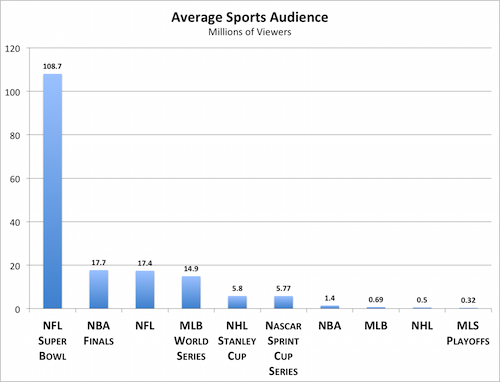
Covid complicates recent years, but attendance has fallen steadily for over a decade. It’s also a known problem.
Maybe the saddest indicator is the league cutting ties with dozens of minor league teams. It’s a cliché to say that the minor leagues are the best part of baseball, but certainly there’s a great attraction to enjoying the sights and sounds of a game without having to dip into your kid’s college fund to afford tickets, parking, and food. Minor league franchises prove that there’s still attachment to the game itself out there, and the fact that MLB clearly sees them as a declining proposition is not great for the future of the sport.
But the bigger problem is one I can’t quantify: my impression from our culture is that young people could not care less about baseball. It’s just not in their headspace. Granted, I don’t exactly have my finger on the pulse of Zoomers, but from my limited vantage point I don’t see any broad engagement with the game. Nielson ratings, while an imperfect gauge for interest, certainly reflect an aging fanbase. Various anecdotal reports suggest the same thing. You can look around on Instagram or Tik Tok and try to gauge the relative interest in MLB and the NBA, the most natural comparison. I think you’ll find the difference is stark and not in baseball’s favor. There’s been years and years of fretting about the lack of visibility for baseball’s biggest stars; Mike Trout has finally been eclipsed as baseball’s best player, thanks to injury and age, but this year’s MVP Shohei Otani should be a sport-transcending star and just isn’t. I concede that, outside of almost-37-year-old LeBron James, the NBA has many more excellent players than famous players and a growing celebrity deficit. But there’s no doubt in my mind that the average American can name more NBA players than baseball players. Long gone are the days of Sammy Sooser and Mike McGwire.
Why? Well, to begin with, there’s the kind of commitment it takes to follow an impossibly long season (162 games!) full of painfully long games. Watching a baseball game isn’t a casual decision. The games are so fucking long that you basically need to clear an afternoon if your plan is to actually watch, rather than to play Fortnite on your phone while the game plays out meekly in the background. Seriously, who has time to regularly invest three hours in a single game, especially across an endless seven month season? I’m not much of a soccer fan, but the fact that they very reliably wrap up inside of two hours has great appeal. A baseball game will while away the hours of your life with casual disregard for your mortality. The trend here is not good!
And note that this steady creep upwards has come at a time when MLB brass have acknowledged the problem and tried all kinds of initiatives to fix it. So now, when interest in the game is low and getting lower, the sport is demanding more and more time if you want to actually follow it. Honestly when it comes to the future health of the league I feel that this element can’t be emphasized enough. You can’t just plop an 8-year-old in front of a game and expect him to follow it for that long, and that steadily eats away at the number of people who are invested as adults.
The length of the average game is an epiphenomenon of other changes in the way baseball is played, and those changes aren’t cool either. The problem isn’t just that certain traditional aspects of the game have faded away, but that those that have are the aspects that create the most chaos, athletic excellence, and sheer wild fun. Pity the stolen base.
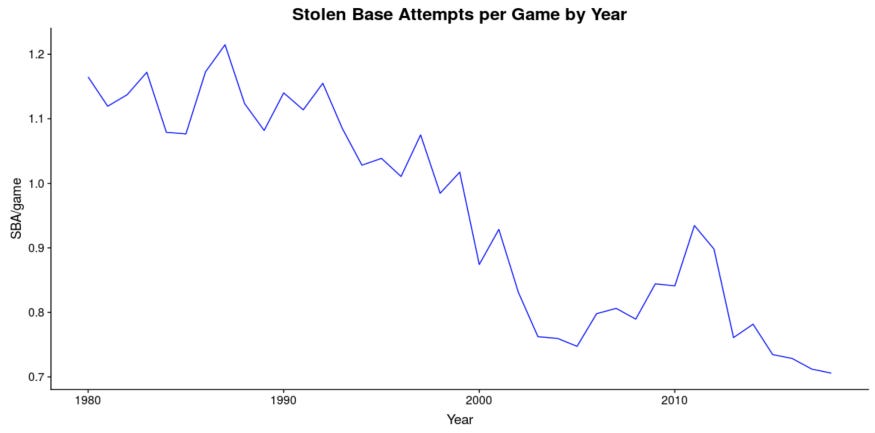
Hey, who would want to watch a play that results from the confluence of managerial savvy, pitcher awareness, baserunner speed and judgement, and catcher arm strength and accuracy? Why would we want to preserve a part of the game that most reliably has fans jumping out of their seats in anticipation of the play? Yes, home runs are fun to witness, but there’s usually not much in doubt about what’s going to happen. A stolen base is a profoundly athletic play with an always-chancy outcome, as well as an act of nerve and bravado. They’re exactly what baseball should be showcasing, so of course they’re slowly dying. Imagine being a baseball exec in the year 2000 and saying to your colleagues, “what we need is for the game to become more leisurely….”
But then, balls are barely in play anymore, so when would you steal? Consider the relationship between strikeouts and hits over time.
Lindberg refers to “MLB’s trend toward less contact and less action on the base paths.” Balls simply aren’t put into play as often, at least if we don’t consider homeruns balls in play for these purposes. (A controversial case.) With the rate of strikeouts trending ever-upwards and a higher and higher percentage of hits being homeruns guys simply aren’t running the bases as much, which incidentally is where most of baseball’s strategy and surprise takes place. It’s kind of absurd. If you had told me when I was in my mid-20s and at peak interest in MLB that balls in play were going to significantly decline, I wouldn’t know how to respond; balls in play are baseball. Meanwhile, all of this inaction seems to have made today’s players a little rusty, as many with decades of experience in the game think that the quality of contemporary baserunning is awful. Not great.
The base paths are empty in part because of the increasing importance of, and strategic emphasis on, the homerun.
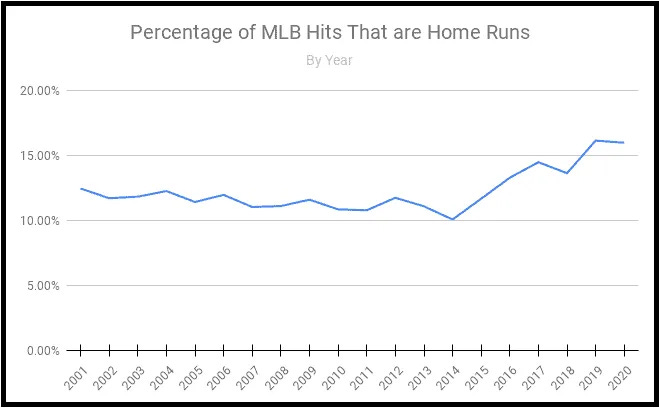
That may look like modest growth, but since there are 40,000+ hits in a baseball season that 6ish% increase since 2013 is a big deal. Expressed as a percentage of runs the trend is stark.

Players are obsessed with launch angle, for the understandable reason that this obsession has seemingly increased homerun totals - 650 more total homers in the 2019 season than in the 2017 season, up a full 10%, to pick one remarkable stat. Teams, meanwhile, are asking players who once would have been instructed to fixate on contact to swing away. I have little doubt that the analytics departments that are asking scrawny middle infielders to approach the batter’s box as if they were Frank Thomas actually does contribute some positive win percentage compared to the previous norm of trying to slap singles or drop bunts. But it’s removed the variety of approaches at the plate that used to make baseball more interesting. Meanwhile the “Moneyball”-era focus on the value of walks and running up large pitch counts has contributed to a steady increase of pitches per plate appearance for 30 years. This means more fouls, more excitement-sapping pitcher changes as guys hit their rigid pitch count limits, and longer games.
The result of all of this is that a game that has an intrinsic tendency towards inaction and guys standing around has seen more of both. I concede that homers are fun, as are strikeouts. But the more you see, the less special they become, and the modern baseball fan sees dramatically more than a previous era’s did. Meanwhile the most athletic, fun, and unpredictable elements of baseball, fielding and baserunning, have become less and less prevalent over time. Guys launch homers or they strike out, wracking up foul balls by the score, and when that’s not happening it’s just pause after pause, long stretches of nothing. We live in an increasingly-frenetic digitally-mediated culture, and Shoeless Joe isn’t coming out of the holy cornfield to entice your kids to watch baseball. It’s really hard to see how the game competes with Twitch and YouTube moving forward, to say nothing of the NFL or the NBA.
All of this has been dictated by the stats departments that are now employed by every team; the changes I don’t like are ultimately their doing. The “old school” managers have evolved or retired out. (76-year-old Tony LaRussa defied expectations both in terms of his team’s success and his willingness to adapt - somewhat - to analytics.) To get the obvious out of the way, sabermetrics works, in the simplest sense of making it more likely for a baseball team to collect wins over the course of the regular season. I still sometimes hear of a stats vs. old school, nerds vs. jocks divide, but that is very old news. Advanced metrics won in a rout in baseball, as they have in basketball. (Arguably there’s a lot of work to be done in that regard in football, but the complexities there are astounding given the ruleset and number of players on the field at any given time.) Statheads have argued for years that balls batted into play are more or less random and stressed the more certain outcomes of homers and strikeouts, among other philosophies. The impact on the game is obvious, and for me, painful.
I recognize that the analytics people set themselves the task of quantitatively identifying the strategies teams could pursue to produce and prevent the most runs, and I understand that they have been very effective in doing so. I understand that it is the job of teams, their front offices, their managers, and their players to optimize their number of wins over the course of a season. None of that is nefarious. The problem is that the resulting product is dogshit. I recognize that safeguarding the popularity of baseball is not the job of the analytics departments. But it is most certainly the job of the teams, as corporations that are part of the entertainment business, whether you like it or not. And the league is made up of the teams.
Now. Do I think the style of play dictated by sabermetrics is the sole cause of baseball’s decline in popularity, in some simplistic way? No. But I think it is certainly an important contributor. I’m sure there’s all kinds of social trends and cultural forces at play in baseball’s current status as the weird old uncle of American sports. One way or the other, though, the only possible route to greater popularity and success is by enticing people with the game itself. That’s it, that’s all you can market yourself on, your product on the field of play. Right now, the product stinks, in my opinion.
You can’t ask organizations that are singularly dedicated to winning to choose to give up advantage. The reform has to come from on top. When the NBA saw that the game had devolved into Knicks-Heat-style low-scoring defensive slugfests, it changed its rules to allow for more freewheeling and open play. The result was a Renaissance of brilliant, free-flowing basketball. The NHL saw that its product was suffering from clutching and grabbing and trapping and adjusted accordingly. They also changed their rules for points in the standings in a way that encouraged teams to play more aggressively in overtime. There will always be tensions between the purity of pursuing the most effective strategies to win and the need to attract enough fans to make money. The UFC faces the constant challenge of balancing the casual fan’s desire to see guys kickbox with the tradition and effectiveness of grappling. I’m personally not at all a fan of the NBA’s all-layups-and-threes era, as it eliminates differences between style of play that make the league fun. But even in this era I still get to watch Ja Morant move like he’s using a cheat code. Baseball simply does not have the displays of individual athleticism baked into its structure to keep my interest in that way. The strategies are just too important for the quality of the product.
What rule changes would I prefer? I don’t know; there are a lot of proposals out there. The trouble is that what kept hitters from hacking at every pitch in the past was baseball culture, and culture changes. It was considered embarrassing to strike out for much of baseball’s history, even as swinging a bat was seen as a hitter’s job. So there was an art to hitting balls into play that guys developed. Cultural resistance to defensive shifts definitely cost some runs but also helped keep balls our of gloves and runners on the base paths. I’m guessing games averaged less than 2:45 for so many decades in MLB because everyone involved was like “this is ridiculous, I’ve got shit to do, let’s get out of here.” Culture is a big driver and I don’t know how you fix it.
But the league has to lead with rules first. Stealing first base? Sounds cool as shit. Start extra innings with a man on second, like they tried during Covid? Great. If it’s still tied after 12? Home run derby, baby. Rules that limit the shift. An honest-to-god, no-bullshit, actually-enforced pitch clock. Or, my dream, just changing the game to seven innings, permanently. I know it’s sacrilege, but look at that goddamn graph up there and tell me that’s sustainable.
I don’t know exactly what to do. But in 2020 the World Series, the goddamn World Series, averaged the same number of viewers as fucking Young Sheldon. Ratings were up for the 2021 series though! Up, that is, sufficiently to be the second least-viewed World Series of all time. Baseball is not in good shape.
If you’re uninitiated into baseball and you watch an inning of play, what will you observe? There’s a man with a ball and he’s throwing it at a man with a stick. The man with the stick tries to hit it three times, taking huge sweeping uppercuts. He fails all three times and he sits back down. The next man comes up. The man with the ball fails to throw it into the good place four times, so now the man with the stick trots leisurely to first base and stands there. Another man comes up with the stick. He too swings it as hard as he can, but he connects, and the ball goes into the stands. Then he and the man at first base trot slowly around the bases and high five everybody. At no point did anyone involved see their heartrate exceed 90 bpm. Throughout there were pauses in the action where nothing happened. This is baseball.
Or you could decide to become a fan of this instead.
In 2021 I’d call baseball a hard sell. Wouldn’t you?

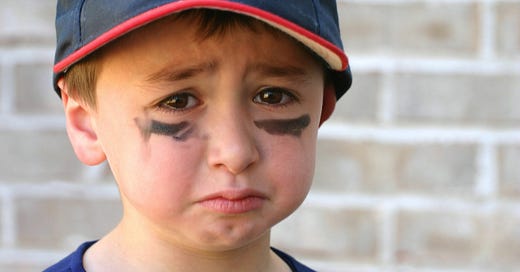





![OC] How the Length of a Baseball Game Has Changed Over 75 Years : r/dataisbeautiful OC] How the Length of a Baseball Game Has Changed Over 75 Years : r/dataisbeautiful](https://substackcdn.com/image/fetch/w_1456,c_limit,f_auto,q_auto:good,fl_progressive:steep/https%3A%2F%2Fbucketeer-e05bbc84-baa3-437e-9518-adb32be77984.s3.amazonaws.com%2Fpublic%2Fimages%2F470f5249-5ce6-4be0-b077-64cb94f9805d_2295x1210.jpeg)
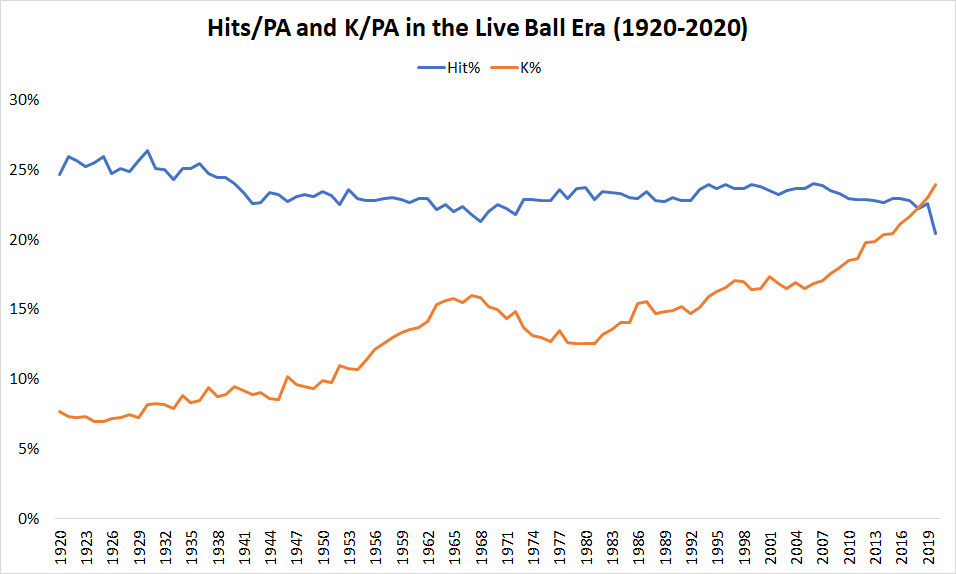
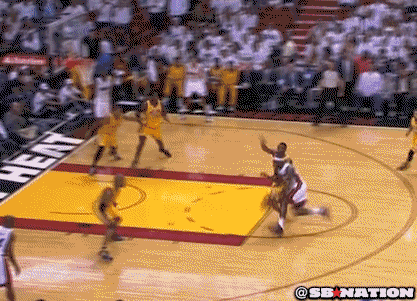
The massive increase in ratings for the 2016 World Series was clearly due to the Cubs. That was the year they finally broke the curse.
I still enjoy the game more than you, but yes, the games are too long and contain too many True Outcome plays (Homeruns, strikeouts, walks).
I find it interesting how extremes dominate sports now (the 3-pointer in the NBA and the homerun in MLB). It mirrors what's going on with our politics, where Woke World and Trump World get all the attention whereas the vast majority of society lives somewhere in between the two.
"Strikeouts are boring. Besides that, they're fascist. Throw some ground balls...it's more democratic."
-Crash Davis (Catcher, Durham Bulls)